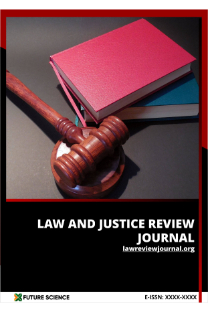THE AMENDMENTS TO THE COMMON FOREIGN AND SECURITY POLICY OF THE EUROPEAN UNION BROUGHT ABOUT BY THE LISBON TREATY
Avrupa Birliğinin Ortak Dış ve Güvenlik Politikasına Lizbon Anlaşmaşı ile Getirilen Yenilikler
___
Angelet Bruno and Vrailas Ioannis, European Defence in the wake of the Lisbon Treaty, Egmont - The Royal Institute for International Relations, 2008Babic Jelena, The Common Foreign and Security Policy of the European Union After the Lisbon Treaty, Western Balkans Security Observer, No: 17, 2010, pp. 3-12
Biondi Andrea, Eeckhout Piet, and Ripley Stefanie, EU Law After Lisbon, Oxford University Press, 2012
Eeckhout Piet, EU External Relations Law, Oxford University Press, 2011
Gaspers Jan, The quest for European foreign policy consistency and the Treaty of Lisbon, Humanitas Journal of European Studies, Volume: 2, No: 1, 2008, pp.19-53
Koehler Kateryna, European Foreign Policy After Lisbon: Strengthening the EU as an International Actor, Caucasian Review of International Affairs, Volume: 4, 2010
Laursen Finn, The EUs Lisbon Treaty: Institutional Choices and Implementation, Ashgate Publishing Limited, 2012
Marangoni Anne-Claire, One Hat too Many for The High Representative Vice President, the Coherence of EUs External Policies After Lisbon, EU External Affairs Review, July 2012, p.4, (pp.4-17)
Margaras Vasilis, Common Security and Defence Policy and the Lisbon Treaty Fudge: No Common Strategic Culture, No Major Progress, EPIN Working Paper, No: 28, 2010
Pernice Ingolf, The Treaty of Lisbon: Multilevel Constitutionalism in Action, Columbia Journal of European Law, Volume: 15, No: 3, 2009, pp.349-407
Piris Jean-Claude, The Lisbon Treaty: A legal and Political Analysis, Cambridge University Press, 2010
Schmidt Julia, Common Foreign and Security Policy and European Security and Defence Policy After The Lisbon Treaty: Old Problems Solved? Croatian Yearbook of European Law and Policy, Volume: 5, 2009, pp.239-259
Wessels Wolfgang and Bopp Franziska, The Institutional Architecture of CFSP after the Lisbon Treaty: Constitutional Breakthrough or Challenges ahead? Challenge Liberty and Security, Research Paper No: 10, 2008, pp. 1-31
INTERNET RESOURCES
EPLO Briefing Paper 1/2012, Common Foreign and Security Policy structures and instruments after the entry into force of the Lisbon Treaty, online at: http://www.eplo.org/assets/files/2.%20Activities/Working%20Groups/ CSDP/EPLO_Briefing_Paper_1-2012_CFSP_After_Lisbon.pdf, accessed on: 30.03.2014
Common Foreign and Security Policy, online at:
http://www.civitas.org.uk/eufacts/download/EX.3.CFSP.pdf, accessed on: 29.03.2014
Davignon Report, online at: http://www.cvce.eu/content/publication/1999/4 /22/4176efc3-c734-41e5-bb90 d34c4d17bbb5/publishable_en.pdf, accessed on: 02.04.2014
The Lisbon Treaty: a comprehensive guide, Common Foreign and Security Policy, online at: http://europa.eu/legislation_summaries/institutional_affairs/ treaties/lisbon_treaty/ai0025_en.htm, accessed on: 02.04.2014
Presidency Report to the European Council on the European External Action Service, Council of the European Union, 14930/09, Brussels 23 October 2009, online at: http://register.consilium.europa.eu/pdf/en/09/st14/st14930.en09. pdf, accessed on: 01.04.2014
- ISSN: 1309-9485
- Yayın Aralığı: 2
- Başlangıç: 2010
- Yayıncı: Türkiye Adalet Akademisi
LA VENTE D'UN ORDINATEUR PRÉINSTALLÉ: UNE PRATIQUE COMMERCIALE DÉLOYALE?
DRUG TRAFFICKING AS A TRANSNATIONAL CRIME*
THE CRITIQUE OF COMMON AGRICULTURAL POLICY OF THE EUROPEAN UNION
SUPPLEMENTARY PROTECTION CERTIFICATES IN EU LAW: A COMPENSATION MECHANISM AND TURKEY'S POSITION
ABSORPTION CAPACITY OF THE EUROPEAN UNION: IS THERE STILL SPACE FOR NEW MEMBER STATES?
IRAQ AND THE CONCEPT OF INTERNATIONAL JUDICIAL COOPERATION IN CRIMINAL MATTERS
THE DANCE OF CRIMINOLOGY WITH POLICY MAKERS AND WIDER PUBLIC
